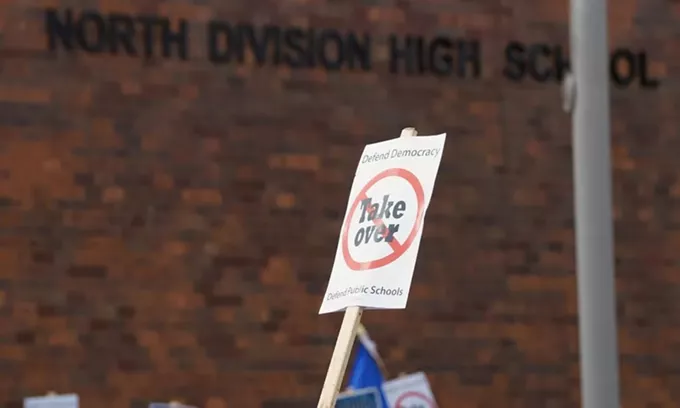Monday, March 7, 2022
In 2019, there were 180 Arizona schools that received a D or F rating and new legislation given preliminary approval by the House would hand over their operations or shut them down if they don’t improve.
House Bill 2808 establishes the Arizona Achievement District. This district is made up of high-performing district and charter schools handpicked by a nine-member board appointed by the governor. Out-of-state charter school operators may also be welcomed into the district.
The new board would use performance data from the 2018-2019 school year and this year to identify struggling schools. No school grading was done between those years due to COVID-19 and the shift to remote learning. Based on these results, schools would be given several choices: independently improve their performance within three years, partner with a high-performing school that will take over operations, be replaced by a “Fresh Start” school with a proven academic track record, close down, or consolidate with a nearby school.
The move is an extension of GOP school choice initiatives that favor charter over public schools. Struggling schools may elect to be replaced with a “Fresh Start” school, or might be forced into the arrangement if they don’t improve on their own. “Fresh Start” schools would be run by an Achievement District School to eventually replace a failing school on the same campus or within its attendance boundaries. They operate out of a vacant building or one which is being leased or purchased from a school district.
During a Feb. 15 Education Committee hearing in the state House of Representatives, sponsor Rep. Michelle Udall said these “Fresh Start” schools would need to be charter schools, because public school districts can’t buy up schools in other districts.
If schools fail to reach a C grade after the three year mark, they will be forced into a partnership with an Achievement District school, a Fresh Start school operation or be shut down, at the Arizona Achievement District board’s discretion.
“The goal is to have only high-achieving schools in the state. The goal is to have no more D and F schools in the state, so that every child can attend a school that is high quality and get the education they deserve,” Udall said during the committee hearing.
The Mesa Republican, who chairs the committee, noted the program’s application of pressure on schools garners positive results.
Udall’s bill last month won preliminary approval in the House of Representatives, but has yet to face a formal vote. If the House passes it, the measure would go to the state Senate for further consideration.
A similar program in Tennessee found exactly the opposite. The state began taking over underperforming schools with its own Achievement School District in 2011 with the goal of moving the bottom 5% into the top 25% in five years. But after nearly a decade of handing struggling neighborhood schools over to charter school networks, the schools failed to meet the state’s performance goal — and the state is now working on moving several of them back into their original districts.
Critics of the bill say its measures don’t actually address the reasons so many schools are struggling.
You have to meet kids where they are and then you have to have the resources to help them grow. They need more, and teachers need more.
– Kristi Wilson, Buckeye Elementary School District superintendent
A 2019 U.S. Census Bureau review placed Arizona 49th in school funding. The state spent about $10,000 on students that year, well below the national average of $15,700. Beth Lewis, the director of Save our Schools Arizona, a public school advocacy organization, pointed out that low funding invariably contributes to lower standardized test scores and graduation rates. It doesn’t help that these schools often operate in already poor communities.
“School performance correlates really closely with the level of district poverty,” Lewis said during a Tuesday afternoon Zoom town hall meeting with school officials about HB2808.
Arizona’s poverty rate was higher than the national rate, even before the devastating impact of COVID-19. Students whose families struggle economically often start school at a lower educational level than their peers, experience schooling gaps and might not have access to high quality learning materials at home.
Many D- and F-rated schools are in communities with entrenched poverty. Marana Unified School District Superintendent Dan Streeter said Roadrunner Elementary in his district was a C-rated school in 2019, but has been heavily impacted by the COVID-19 pandemic and he worries it may be in danger in the future if Udall’s legislation passes. About 82% of Roadrunner’s student body is on the free and reduced lunch program, and the surrounding community’s median income is 60% lower than the average for the rest of Marana. Its placement in a rural area means that community resources are scarce: The nearest library is 14 miles away.
“These are factors that impact letter grades,” Streeter said.
Expecting school districts to resolve systemic issues in such a short period of time is hardly fair, especially when the bill doesn’t provide adequate funding to do so, Tucson Unified School District Superintendent Gabriel Trujillo said.
Schools that choose the bill’s self-improvement route would be granted $150 per student for three years. For schools that are already overstretched, critics say that investment is insufficient. In Maricopa County, Buckeye Elementary School had an F rating in 2019. Its enrollment was 904 last year – assuming enrollment stays fairly equal, the total funding Buckeye Elementary might receive to turn around their performance is $405,000.
If schools decide to partner with an Achievement District or “Fresh Start” school — relinquishing their control and, in the latter case, the whole school — they may apply for one-time funding of $2,000 per student. That “partner” may end up being an outside charter school operator who profits from taxpayer money.
Implementing punitive measures shifts the focus from student growth to performance and is detrimental to students in the long run, critics said. Punishing schools for not meeting standards drives away high quality teachers — the most valuable asset in a school’s arsenal. Arizona continues a six-year streak of teacher shortages, and a survey last month found nearly 2,000 vacancies.
“When you have a student body that is more needs-intensive and you have a more punitive model for determining school letter grades and determining teacher performance-based pay, that doesn’t necessarily romance the most highly qualified applicants to come and take teaching positions,” Trujillo said.
The schools most at risk of facing takeovers are those that serve marginalized communities. Lewis estimates that 22 out of 77 schools in the Navajo Nation would be affected by HB2808. Joe Bia, a governing board member at Kayenta Unified School District, said that keeping schools open in Kayenta is critical. The town is rural and isolated, and schools and their after-school programs are among the only educational resources for youths. Shutting them down means cutting kids off from internet access they may not have at home.
Changing the way these schools work to meet performance standards might also put the cultural identity of schools at risk. KUSD families are predominantly Navajo, and he said the schools work to preserve their cultural heritage and language in classrooms.
“If we’re going to have to change the way that we’re running our schools, I can see that panning out in many catastrophic ways — one impacting elemental cultural aspects,” Bia said.
Tucson Unified School District is another district with cultural identities that would be negatively affected by eliminating local control. It’s home to the largest Afghan refugee student population, a sizable English Language Learner cohort, and is the top choice for Tohono O’odham and Pascua Yaqui families. Trujillo said he doubts transplanting educational frameworks from other regions into a place as diverse as Tucson would work.
“Our communities and our staff that serve these communities know the needs of our children and our communities best. And what they need is support — they need resources and they need time,” he said.
Instead of forwarding potentially devastating programs, legislators should support programs with proven success rates, like Project Momentum, said Kristi Wilson, the superintendent of Buckeye Elementary School District. The project works in collaboration with school staff to help foster professional development for teachers, design tracking and evaluation methods, and craft curriculum maps and pacing guides to keep classrooms in step with state standards.
It also provides funding equivalent to HB 2880 — $150 per pupil. But the difference is the guidance that comes along with it, and a lack of punitive measures.
Avondale Elementary School District significantly improved working with the Project, tripling their AzMerit mathematics scores and nearly doubling scores in English in the 2017-2018 school year from the baseline established in 2014-2015. Still, those three years of gains were not enough to move all their schools out of D grade territory. A short turnaround time for schools with long-standing difficulties simply isn’t feasible, Save Our Schools Arizona noted in a written fact sheet for Tuesday’s town hall.
“You have to meet kids where they are and then you have to have the resources to help them grow,” Wilson said, “They need more, and teachers need more.”
Arizona Mirror is part of States Newsroom, a network of news bureaus supported by grants and a coalition of donors as a 501c(3) public charity. Arizona Mirror maintains editorial independence. Contact Editor Jim Small for questions: info@azmirror.com. Follow Arizona Mirror on Facebook and Twitter.
Friday, March 4, 2022
But Lake doesn't always practice what she preaches. At an October candidate forum, she said Arizona "needs a governor who is going to bring manufacturing back to Arizona."
"We're going to build it in Arizona," she said. "We're going to hire Arizonans. And we're going to buy Arizona products."
But when it comes time to buy campaign swag, Lake seemed to prefer buying it from Honduras, as the above photo of a $40 (!) Kari Lake T-shirt shows.
Team Lake did not respond to a request for comment about buying overseas shirts rather than finding an Arizona manufacturer.
Maybe she just couldn't find T-shirts made in the USA—unlike her GOP primary opponent Matt Salmon, whose much more affordable $25 T-shirts are made in the USA.
It's not so surprising, given that her role model had trouble finding U.S. manufacturers as well.
Thursday, March 3, 2022

A bill that would prohibit the Arizona Board on Geographic and Historic Names from naming any geographic feature, place of historical significance, or specified road using the derogatory term “sq***” has passed the Arizona Senate and is headed to the House.
“Words like this have no place in our language and on our state lands,” Sen. Victoria Steele said during the Natural Resources, Energy and Water Committee Hearing on Feb. 16.
“Our state lands are meant to be celebrated and enjoyed and shared,” Steele continued. “There is no need to use it in a way that would be considered offensive to Native women, hurtful to Indigenous people.”
The bill was introduced by Steele, a Tucson Democrat, and won approval from the full Senate on Feb. 24, the same day the U.S. Department of Interior announced their replacement names for the more than 660 geographic features with the derogatory term on federal land, 67 of which are in Arizona. The bill passed 26-2.
In many cases, people see the term to simply mean Native woman or Native wife, but within the Indigenous community and among Indigenous women it has a more negative and offensive meaning tied to it. Historically been used to sexualize Indigenous women because it refers to female genitalia.
“For centuries this term has been considered and used as an offensive ethnic or racial and sexist slur against Indigenous women,” Steele said in the committee hearing. “Indigenous women should be honored and held sacred, not the recipient of insults and slurs. Let’s begin by removing these hurtful terms.”
In response to Steele’s remarks in the committee, Sen. Rick Gray said when he initially saw the bill, he was confused because he’s only ever known about the term is “that’s a wife, and I don’t see anything negative in that.”
“We’ve had Sq*** Peak, and I don’t look at that as derogatory. If anything, it’s saying, here is a Native American wife and we name a peak after her,” Gray, a Republican from Sun City, said.
Steele said that the renaming of Piestewa Peak in 2008 is a more high-profile case that has occurred in the Valley, but it doesn’t surprise her that a lot of people don’t know the term is derogatory.
Steele said that although it may have been used to refer generally to a woman or wife, Europeans historically used it to sexualize Indigenous women — and that is how it is still perceived by Indigenous women.
“Our women were not valued and held sacred,” she said. “I’m literally shaking, I’m nervous inside because this is hard to talk about.” “It reminds me of this painful part of history and it’s hard to talk about,” Steele said.
“This word is received that way by Native women, and if you’ve never been a Native woman, you’ve probably never had occasion to even think about it. It is very hurtful.”
Schools would be required to publicly post every new book bought for their libraries, have elected governing board members approve all new book purchases and let parents know every book their child checks out under a proposal Senate Republicans advanced Tuesday.
Critics said the new requirements would decrease diversity of viewpoints by adding library books to the ongoing school culture wars that have roiled school districts in Arizona and across the nation over the past year.
Special education teacher Alicia Messing spoke against the measure, saying it could potentially lead to censorship of diverse viewpoints if parents disagree with them. She pleaded with the Senate Education Committee to recognize that it could inspire heightened polarization and stifle representation in school literature.
“We have lots of control over what books we choose to have on our bookshelves and our nightstands. We do get to control what books we read and what books our children read. What we don’t get to do is choose for everybody,” she said.
But Rep. Beverly Pingerelli, R-Peoria, said the bill was all about increasing transparency and keeping parents in the loop about what their children are learning.
“If parents have an issue with anything that’s being purchased in the library, they have the ability to speak to their governing board,” she said.
Her measure, House Bill 2439, passed the House of Representatives on Feb. 15 on a party-line vote, with only Republican support.
Committee members said there were a host of logistical concerns.
Sen. Christine Marsh, D-Paradise Valley, wondered if all current books would need to be posted for review. There were several moments of confusion as neither Pingerelli nor committee staff were able to answer her question. Finally, Sen. Tyler Pace, R-Mesa, reread the bill’s stipulations and concluded that current books are exempt from the 60-day public review process but not from being included in the online catalog.
Marsh, a former teacher, also objected to the unpaid workload addition. Many schools don’t have full-time trained librarian staff. Those schools are exempted from posting a list of new purchases online, but not from preparing individual student lists if a parent requests them.
“This becomes another unfunded mandate. It implies there is manpower for this. I can’t stress enough, folks: librarians, front office people and administrators are already understaffed and covering for sick teachers in the classroom. There is an overwhelming shortage of manpower at most schools,” she said.
A January survey from the Arizona School Personnel Administrators Association reported that nearly 2,000 teacher positions remained unfilled and more than 3,000 vacancies were filled by people who don’t meet standard teacher requirements.
Pace questioned whether the workload might discourage librarians from making purchases and keeping their shelves stocked, if every new book means dealing with burdensome reporting requirements.
While Pingerelli admitted HB2439 could benefit from amendments, it was passed on a party-line vote and will move towards the Senate floor for debate.
Parental access to classrooms
The committee also opened up every Arizona classroom door to parents, whether their child attends the school or not, as long as they are considering enrolling them. Rep. Michelle Udall, R-Mesa, said she introduced House Bill 2025 after a constituent told her she was prevented from touring potential middle school special education programs for her daughter.
“As a parent of special needs children, I understand how important it is to see whether or not a classroom is going to be a good fit for the child,” she said.
The bill requires schools to develop visitation, tour and observation policies and publicly post the processes on their website. Policy conditions like when, how many people or how often they may visit are left up to administrators.
Karla Phillips-Krivickas is the mother who reached out to Udall after her request to tour middle school special education classrooms was repeatedly denied at one school, despite the Arizona Department of Special Education Director saying the school’s reasoning that it would constitute a FERPA violation was incorrect.
The bill’s language doesn’t specify visits only to special education classrooms.
“Every school is different, some are small, some are big, so how they construct their classrooms is very different,” Phillips-Krivickas explained, adding that most special needs children spend a lot of time in general education classrooms.
A data review from The National Center for Education Statistics estimated that 60% of students with disabilities spent more than 80% of their time in general education classes from 2009 through 2019.
Sen. Sally Ann Gonzales, D-Tucson, expressed concern that opening up access to special education classes could be detrimental for some students. She said that her friend is a special education teacher and several of her students are particularly emotional and have had violent reactions before.
And Marsh added that some general education classes have difficulty staying on track at the best of times.
“There are some classes where a pin dropping two miles away is a distraction,” she said.
Udall responded that different classrooms would necessitate different policy applications, and the bill allows for that. It includes an exemption for situations in which visits might risk the health or safety of students and staff, and also allows schools to set their own policy around the visits. Still, it’s important for parents to be able to examine the conditions their children will be in day in and day out, she reiterated.
“(It’s) a really scary thing to ask me to put my non-verbal daughter in a classroom and to never ever be able to see it and see what’s going on. Now granted, I think this is something that should be available to all parents, that’s why the bill is not specifically just for special education, but there definitely have to be nuanced policies for each school,” she said.
HB2025 was approved almost unanimously, with only one dissenting vote. Two of those who voted for it expressed reservations about the bill, but voted to send it to the full Senate for further consideration.
Arizona Mirror is part of States Newsroom, a network of news bureaus supported by grants and a coalition of donors as a 501c(3) public charity. Arizona Mirror maintains editorial independence. Contact Editor Jim Small for questions: info@azmirror.com. Follow Arizona Mirror on Facebook and Twitter.

WASHINGTON — U.S. Department of Homeland Security officials outlined to House members on Wednesday problems with a Trump-era immigration policy that federal courts are forcing the agency to follow.
One of the Department of Homeland Security officials, Blas Nuñez-Neto, said that the court-ordered Migrant Protection Protocols is a flawed policy program and the agency believes it should be terminated.
MPP requires migrants from Mexico who are seeking asylum to remain in Mexico while their paperwork is processed, but many advocates have documented harm, separation, and deaths to those who must comply with the program.
Nuñez-Neto is the Acting Assistant Secretary for Border and Immigration Policy at the U.S. Department of Homeland Security.
Republicans on the House Homeland Security subcommittee were dismayed to hear officials from DHS criticize the program, also referred to as “remain in Mexico” policy.
“Why would we expect DHS to implement this in good faith?” the panel’s top Republican, Clay Higgins of Louisiana, asked. “We expect compliance with the law.”
The program was implemented under the Trump administration in 2019. The Biden administration sought to terminate the program in June 2021, but the U.S. District Court for the Northern District of Texas determined in Texas v. Biden that the termination memo was not issued in compliance with the Administrative Procedure Act and ordered the Department of Homeland Security “enforce and implement MPP in good faith,” which the agency has done.
Nuñez-Neto and Emily Mendrala, the Deputy Assistant Secretary of the Western Hemisphere Affairs at the U.S. Department of State, both said the MPP policy was still in place and being carried out.
Mendrala said that one of the flaws of the program is many “MPP enrollees were preyed upon by criminal groups upon reentry to Mexico.”
Rep. Andrew Clyde, a Georgia Republican, asked Mendrala if she supported the program.
“That’s the law of the land,” Clyde said, adding that he thinks it’s a fair program.
She said the administration has been clear that it does not support the program, but will continue to implement it as required by the court.
The Republican witness, Tim Roemer, the director of Arizona’s Department of Homeland Security, defended the program, and said it helps “keep the situation at the border under control.”
“Unfortunately, the Biden administration’s reversal of these policies chipped away at the progress made securing the border under the previous administration to make a political statement while putting public safety at risk,” he said.
The chair of the subcommittee on Border Security, Facilitation, & Operations, Rep. Nanette Diaz Barragán, a California Democrat, said that the border is not open, like Republicans on the panel and Roemer were arguing, because of Title 42, which allows the government to prevent non-citizens from entering the country during a health crisis, such as the COVID-19 pandemic.
“This notion that the border is open is completely false,” she said. The United States should “get back to the process of what is legal in this country, and what is legal in this country is to allow migrants to come to a port of entry,” she added.
This article originally appeared in the Arizona Mirror, a nonprofit news organization.

A day after the Arizona Senate voted to censure Flagstaff Republican Wendy Rogers for comments she made at a white nationalist conference and a string of inflammatory social media posts, another one of her colleagues challenged her to condemn those she had praised in a fiery speech on the Senate floor.
“I contend that this is unbecoming rhetoric, it is inappropriate rhetoric,” Sen. Kelly Townsend, R-Mesa, said on the Senate floor Wednesday.
Townsend on Wednesday told senators that she wanted Rogers to condemn white nationalist Nick Fuentes, who’s conference, the America First Political Action Conference, Rogers had spoken at the week prior.
Rogers addressed the AFPAC crowd remotely, effusively praising Fuentes, who she said had been “de-platformed everywhere” because he says things that upset “the media and the far left.”
Fuentes, an advocate of turning America into a nation only for white Christians, is one of the leaders of the so-called “groypers” — along with the founder of American Identity Movement, a white nationalist group formerly known as Identity Ervopa — and Rogers is one of its emerging icons. The groyper movement is a collection of white nationalists who seek to normalize racism and make it a part of mainstream conservative political ideology.
He is an open racist, a Holocaust denier and has boasted about being antisemitic.
Townsend was absent for the censure vote on Tuesday because of a medical issue with her daughter. The Apache Junction Republican said that she would have likely voted in favor of the censure — unless Rogers chose to denounce Fuentes. She said she believed that Rogers did not hold the same antisemitic and hateful views but was supporting Fuentes for reasons of “free speech.”
“I’m hoping she doesn’t agree with them,” Townsend said. “Let the record show that, if the senator is willing to apologize for a misunderstanding and denounce this, then my vote would have been red in the name of free speech.”
Rogers did not denounce Fuentes on the floor of the Senate.
“I don’t agree with guilt by association,” Rogers said in response to Townsend’s comments. “I love my fellow man, I love all people from all groups.”
Rogers also claimed that the censure was her words being taken out of context and an issue of free speech.
“I reiterate, this is about free speech. And if one senator can put words in my mouth to cause a censure, then all of us would qualify for a censure at some point in the future,” Rogers said.
The day she appeared at AFPAC, Rogers shared a photoshopped illustration of herself, Fuentes and Gab CEO Andrew Torba behind a dead rhino emblazoned with both the CPAC logo (referring to the Conservative Political Action Conference letters, which AFPAC was created to counter) and a Star of David.
On Friday, prior to her speech at the racist AFPAC event, Arizona lawmaker Wendy Rogers posted this photoshopped image on her Gab and Telegram accounts. She’s pictured in the center. The dead rhino is branded with the letters CPAC, which includes a Jewish Star of David. pic.twitter.com/opVZayv0F2
— Nick Martin (@nickmartin) March 1, 2022
Rogers also posted a number of claims about George Soros and the Rothschilds, including one post claiming that they both control the banks, an antisemitic conspiracy theory which dates back to the mid-19th century. The same conspiracy theory was later amplified by Hitler’s propaganda minister, Joseph Goebbels, in 1940.
Rogers and Townsend have been close political allies who late last year found themselves drawn into the same legislative district, despite living hundreds of miles apart. Rather than face off in 2022, Townsend opted to declare her candidacy for a southern Arizona congressional district — that she doesn’t live in — and Rogers swiftly endorsed her.
In a text exchange with the Arizona Mirror, Townsend said she would not be reconsidering her campaign plans and intended to continue her run for Congress.
The censure has become a point of pride for Rogers, who shared artwork Wednesday afternoon by a groyper artist depicting Rogers smiling with a medal and the vote for her censure displayed behind her.
Shortly after the discussion on the Senate floor, Rogers sent out a fundraising email about the censure. Titled “We don’t like your mean tweets,” Rogers says in the email that the “uniparty” is attempting to silence her.
“It’s time to say enough is enough,” Townsend said in a separate Senate floor speech about the fundraising email. “I don’t appreciate getting emails in my email box accusing me of things that I am not guilty of so that somebody can fill their coffers and pay their nephew and buy somebody a new car.”
Rogers’ nephew, Spence Rogers, runs a Florida-based political consulting firm called Go Right Strategies. Rogers paid the company $408,000 in 2021.
The Arizona Republic reported Wednesday that Senate GOP leaders were mulling stripping Rogers of her committee assignments because of she was attacking her fellow senators to raise campaign money.
Before her floor speech Wednesday, Townsend used social media to denounce Fuentes, and called on Rogers to do the same. But her post elicited criticism from far-right users, who accused her of not supporting freedom of speech by exercising her right to speak out against Fuentes.
“I received ugly blowback from people on my side,” Townsend said. “Like being in a piranha tank — but I’m not afraid of the piranha tank anymore.”
Townsend herself is no stranger to controversy. In 2019, Townsend toured the border with the extremist group AZ Patriots whose leader walked around the Arizona State Capitol with a “kekistan” flag, a white nationalist symbol used to troll liberal events.
And last year, Townsend compared vaccine supporters to Nazis and sharing an image of needles in the shape of a swastika on social media. When the Anti-Defamation League sharply criticized her rhetoric, Townsend rebuked the 108-year-old Jewish organization. “Learn your history,” she retorted.
Jeremy Duda contributed to this report.
Arizona Mirror is part of States Newsroom, a network of news bureaus supported by grants and a coalition of donors as a 501c(3) public charity. Arizona Mirror maintains editorial independence. Contact Editor Jim Small for questions: info@azmirror.com. Follow Arizona Mirror on Facebook and Twitter.
Look at us, we’re sports reporters! … Ducey dodges Rogers questions per usual … And a new job for school librarians.
We wouldn’t call ourselves sports fans by any stretch of the imagination, but we’ve paid attention to the Major League Baseball lockout because it’s a huge labor story and an underappreciated government story.
If you’re as aware of sports as we are, some backstory: MLB owners locked out their players about three months ago after the collective bargaining agreement between the players and league expired. They’ve continued to negotiate since, but the league announced this week that Opening Day would be pushed back.
It's unknown when negotiations will resume, but the two sides are leaving Florida tomorrow with no meetings scheduled. Spring training games are canceled until further notice, with games likely wiped out for most of March.
— Bob Nightengale (@BNightengale) March 1, 2022
That’s left Spring Training basically up in the air. It was supposed to start in late February. While our grasp on the calendar is typically loose, we do know that it is now March.
Wednesday, March 2, 2022

The first censure in the Arizona Legislature (we think) ... All the Republicans who love early voting like the rest of us ... And another round of subpoenas.
Wendy Rogers became the first Arizona senator to be censured yesterday after 24 of her colleagues voted in favor of a condemnation of her behavior.
You can call the censure historic, but that’s about all you can call it. It carries no penalties. She’ll continue to hold her office. She very much did not apologize. She likely won’t change. We expect the “sweet grandma” will only get worse from here.
The censure itself is timid. It doesn’t call out Rogers’ racism, anti-Semitism, white nationalism. Instead, it seemed her threats against other senators — like saying she’d “personally destroy any Republican who partakes in the gaslighting of me simply because of the color of my skin” — were what did her in.
An earlier draft of the censure resolution, which Rogers posted on the right-wing social media platform Telegram, did include stronger language: It mentioned racial and religious discrimination, as well as her comments on the Russian invasion of Ukraine. The version read on the Senate floor called out her statements “encouraging violence against and punishment of American citizens,” and her threats of “political destruction” for those who disagreed with her views.
Tuesday, March 1, 2022
In the wake of her speech to a white nationalist conference and a string of offensive and inflammatory social media posts, the Arizona Senate voted to censure Republican Sen. Wendy Rogers.
The Senate voted 24-3 in a rare censure of one of its own, with 11 of the chamber’s 16 Republicans siding with the chamber’s 13 Democratic members who were in attendance. Rogers voted no, as did GOP Sens. Nancy Barto and Warren Petersen.
The censure, which has no practical effect, was for comments calling for people she perceived as enemies to be hanged from gallows, and for social media postings Rogers made threatening to “personally destroy” fellow Republicans who sought to punish her. The censure resolution was silent on her embrace of white nationalists and a string of antisemitic and racist things she had posted online in recent days.
Rogers, a Flagstaff Republican, didn’t defend or even address her comments on the Senate floor. Instead, she called the censure an attempt to limit her freedom of speech.
“I represent hundreds of thousands of people and the majority of them are with me. And they want me to be their voice. You are really censuring them. I do not apologize. I will not back down. And I am sorely disappointed in the leadership of this body for colluding with the Democrats to attempt to destroy my reputation,” Rogers said. “In the end, I rejoice in knowing I do and say what is right. And I speak as a free American, regardless of the actions of this corrupted process today.”
However, Senate President Karen Fann said the censure wasn’t about freedom of speech.
“We do support First Amendment freedom of speech. We absolutely support it. We fight battles over it. But what we do not condone is members threatening each other, to ruin each other, to incite violence, to call us communists. We don’t do that to each other,” said Fann, a Prescott Republican. “We, as elected officials, are held to a higher standard.”
Rogers spoke to the white nationalist America First Political Action Conference on Feb. 25. She called for gallows to be built so “high-level criminals” and “traitors who have betrayed our country” can be publicly hanged. She also unleashed a torrent of antisemitic tropes on social media over the weekend earlier this week, and voiced overt support for Russian President Vladimir Putin’s invasion of Ukraine.









